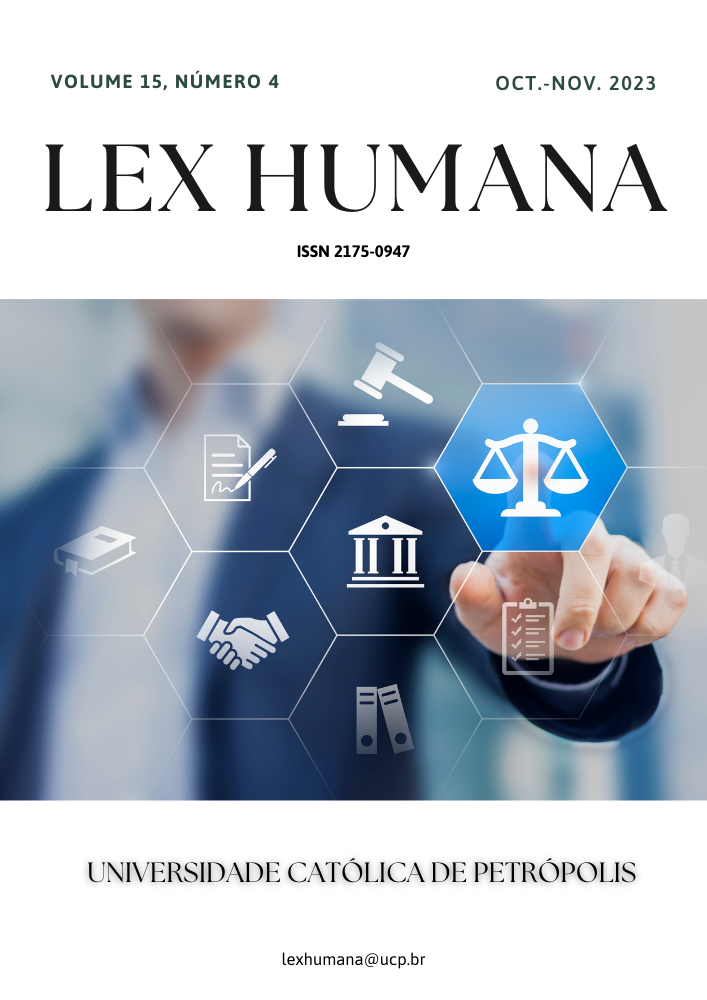Abstract
The purpose of the article is to highlight the principles of the acquisition of legal competencies by non-lawyers in the context of interdisciplinarity and multiculturalism of modern legal education. The task of the research is to differentiate the concepts of legal awareness and legal training in the educational system. The research methodology is based on the use of both the usual general scientific arsenal and specific scientific, pedagogical, scientific, and legal methodological elements. A separate methodological component is the principle of systematization of legal knowledge, which is implemented exclusively in the educational space. As a promising area of research, it is advisable to determine the need to form a holistic paradigm of human legal consciousness, which will be based on legal education training regardless of the specialty and specialization of the student. Thus, legal training in the educational environment has a number of criteria which determine the quality of acquisition of knowledge of jurisprudence by specialists of non-legal specialties. Among them are: legal knowledge as an element of flexible skills, legal education as part of general humanitarian-oriented competencies, legal consciousness as one of the main worldview components of civil society.
References
List BRUNSCHWIG, C. R. Visual Law and Legal Design: Questions and Tentative Answers. Proceedings of the 24th International Legal Informatics Symposium IRIS, 2021, p. 179-230. Retrieved from: https://ssrn.com/abstract=3795332
CASERTA, S. Digitalization of the Legal Field and the Future of Large Law Firms. Laws, v. 9, n. 2, 2020, p. 14. https://doi.org/10.3390/laws9020014
CASERTA, S.; MADSEN, M. R. The Legal Profession in the Era of Digital Capitalism: Disruption or New Dawn? Laws, v. 8, n. 1, 2019, p. 1. https://doi.org/10.3390/laws8010001
CHEN, B.; LI, Y.; ZHANG, S.; LIAN, H.; HE, T. A Deep Learning Method for Judicial Decision Support. IEEE 19th International Conference on Software Quality, Reliability and Security Companion, 2019, p. 145-149. https://doi.org/10.1109/QRS-C.2019.00040
FRYŠTÁK, M.; TEXL, D. The Relationship between Criminalistics and Criminal Law and Its Importance as a Non-legal Science of Criminal Law in the Teaching of Criminal Law at Faculties of Law (in the Czech Republic). Straipsniai, 2, 2022, p. 135-145. Retrieved from: https://repository.mruni.eu/bitstream/handle/007/18631/Kriminalistika%202022-2-135-145.pdf?sequence=1&isAllowed=y
GREALY, F.; COLLENDER, S.; LUNNEY, J.; O’BOYLE, R. Moodle & MOOCs: Bringing professional legal education mainstream –the MOOC experience at the Law Society of Ireland. European Journal of Law and Technology, v. 10, n. 2, 2019. Retrieved from: https://ejlt.org/index.php/ejlt/article/view/646/972
HALUNKO, V.; BOHATYROV, I.; SHKUTA, O.; BONDAR, V.; KARBOVSKYI, D. Legal regulation of higher legal education. Foreign experience and prospects in Ukraine. Revista de la Universidad del Zulia, v. 13, n. 38, 2022. http://dx.doi.org/10.46925//rdluz.38.15
HUMENNA, N. V.; KALYNIUK, N. M. Legal competence as a necessary component of the professional competence of the future medical workers. Medical education, v. 1, 2023, p. 104-112. https://doi.org/10.11603/m.2414-5998.2023.1.13832
JOHNSTON-WALSH, L. Dynamic interdisciplinary exercise for juvenile and family law students. Family Court Review, v. 60, n. 4, 2022, p. 736-756. https://doi.org/10.1111/fcre.12673
KHAN, H. Business Students' Perspective of Learning Law Education. Studies of Applied Economics, v. 39, 2021. https://doi.org/10.25115/eea.v39i10.5407
KOTZÉ, L. J.; BLANCHARD, C.; GELLERS, J. C.; HOLLEY, C.; PETERSMANN, M.; VAN ASSELT, H.; BIERMANN, F.; HURLBERT, M. Earth system law: Exploring new frontiers in legal science. Earth System Governance, v. 11, 2022, p. 100126. https://doi.org/10.1016/j.esg.2021.100126
LEE, J. From Socrates to Selfies: Legal Education and the Metacognitive Revolution. SSRN, 2020. Retrieved from: https://ssrn.com/abstract=3631073
LESZNYÁK, M. Comparative analysis of translations prepared by students with and without legal qualifications. Comparative Legilinguistics, v. 37, 2019. http://dx.doi.org/10.14746/cl.2019.37.3
MOORE, L. Crossing Boundaries: Exploring Multi-Disciplinary Models for Legal Problem Resolution. Canadian Forum on Civil Justice, v. 2, 2022. Retrieved from: https://digitalcommons.osgoode.yorku.ca/cfcj/2
PÉLISSE, J. Varieties of Legal Intermediaries: When Non-legal Professionals Act as Legal Intermediaries. Legal Intermediation (Studies in Law, Politics, and Society), v. 81, 2019, p. 101-128. https://doi.org/10.1108/S1059-433720190000081005
PRYLYPKO, V.; KOTLIARENKO, O.; PRYPOLOVA, L.; DMYTRUK, T.; PARUTA, O. Theoretical and methodological bases of formation of legal competence of future specialists of non-legal specialties. Cuestiones Políticas, v. 40, n. 73, 2022, p. 837-853. https://doi.org/10.46398/cuestpol.4073.48
PUHACH, S.; AVRAMENKO, K.; MICHALCHENKO, N.; CHYCHUK, A.; KUCHAI, O.; DEMCHENKO, I. Formation of Specialists’ Legal Competence in the System of Life Long Education. Revista Romaneasca pentru Educatie Multidimensionala, v. 13. 2021, p. 91-112. https://doi.org/10.18662/rrem/13.4/472
REEMS, L. Humanizing the teaching of Business Law for non-law university students of Business Administration. International Scientific Journal of Universities and Leadership, 2021, p. 5-12. https://doi.org/10.31874/2520-6702-2021-12-2-5-12
SCHÄFKE-ZELL, W.; ASMUSSEN, I. H. (2019). The Legal Profession in the Age of Digitalization: An outline of Three Potential Transformations in Legal Education. Utrecht Law Review, v. 15, n. 1, 2019, p. 65-79. https://doi.org/10.36633/ulr.454
SCHÄFKE, W.; MAYORAL, J.; HVIDT, M. Socialisation to interdisciplinary legal education: an empirical assessment. The Law Teacher, v. 52. 2018, p. 1-22. https://doi.org/10.1080/03069400.2017.1415080
SPYRYDONOVA, Y. (2021). The “competence” concept in the educational system of European countries within a competence-oriented approach. ScienceRise, 2021, p. 60-67. https://doi.org/10.21303/2313-8416.2021.002238
STORR, C.; MCGRATH, C. In search of the evidence: digital learning in legal education, a scoping review. The Law Teacher. 2023. https://doi.org/10.1080/03069400.2022.2133212
TALESH, S. A. Constructing the Content and Meaning of Law and Compliance. In Sokol, D. D., van Rooij, B. (org.). Cambridge Handbook of Compliance, v. 27, 2021. https://ssrn.com/abstract=3572364
TALESH, S.; PÉLISSE, J. (2019). How Legal Intermediaries Facilitate or Inhibit Social Change. Studies in Law, Politics, and Society, v. 79, 2019, p. 111-145. https://doi.org/10.1108/S1059-433720190000079007
TRANG, D. V. Injecting Humanity (Back) into Talent Development. In JACOB, K., SCHINDLER, D., STRATHAUSEN, R., WALTL, B. (org.), Liquid Legal – Humanization and the Law. Law for Professionals, 2022, p. 289-316. Springer, Cham. https://doi.org/10.1007/978-3-031-14240-6_14
TRINKNER, R.; REISIG, M. D. Celebrating 50 years of legal socialization. Journal of Social Issues, v. 77, 2021, p. 281-290. https://doi.org/10.1111/josi.12458
WATKINS, D. Reimagining the relationship between Legal Capability and the Capabilities Approach. International Journal of Public Legal Education, v. 5, n. 1, 2021. https://doi.org/10.19164/ijple.v5i1.1082
ZHENG, J. Exploration on the mode of law undergraduate education in the background of judicial examination reform. International Journal of Electrical Engineering & Education, 2021. https://doi.org/10.1177/00207209211005269

This work is licensed under a Creative Commons Attribution-NonCommercial-NoDerivatives 4.0 International License.
Copyright (c) 2023 Lex Humana (ISSN 2175-0947)

